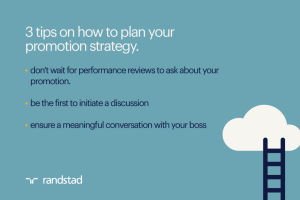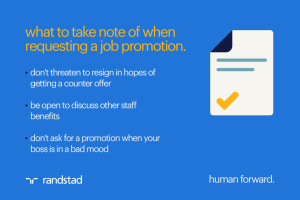The performance appraisal period is just around the corner, and some of us might see this as an opportunity to ask for a promotion and pay raise. However, this also means we would be expected to lead the conversation about our career aspirations with our managers, the human resources team and the management team at large – which can be intimidating.
Everyone’s career path is different, and there is no absolute approach to how each of us should progress in our career. However, you can take charge of yours by working on your career advancement strategy. Plan ahead and take the necessary steps to boost your chances of getting a promotion, pay raise or bonus.
When should you ask for a promotion?
There is always an appropriate time to ask for a promotion, and the timing varies for everyone. The right time to ask for a promotion is when you are able to prove to yourself that you deserve it, and not just because you feel you are ready.
If you are eyeing for a specific position and are ready to request for a promotion, we advise using salary comparison tools online to benchmark yourself in terms of pay, work responsibilities and talent demands in Singapore’s current job market, to prepare yourself for the negotiation. Such tools include the salary comparison tool by the Ministry of Manpower designed from the official salary data in Singapore. There is also the Randstad Salary Calculator which provides an accurate personalised salary report informing you where you stand based on your skills and work experience.

Here’s when and how you can get this conversation started with your manager:
1. Be the first to initiate a discussion
Nobody will know that you are prepared or want a job promotion or a pay raise unless you make your intentions known. The first step is to let your manager know by initiating a discussion. You should always ask your manager about your career progression path in the organisation. It does not hurt to be forthright. Find out how you can position yourself to get to a higher level and be promoted, or be considered for a pay raise.
It is usually a good time to proactively ask for a boost in your career after a successful project launch or when your contributions had a significant impact on the organisation’s goals. These are all good indications that you are ready for more responsibilities such as taking on a new project or expanding your role to other functions or markets.
The key to a good promotion strategy is to manage your expectations, and avoid coming across as being too aggressive in your request. There might be a chance that you need to prove yourself further by meeting stretched goals, for your manager to build a better case for your job promotion. At least you’ll know what you need to do to progress further in your career.
2. Don’t wait for performance appraisal periods
While performance appraisals may be great opportunities to ask for a promotion or salary increment, you can also raise it during other times. Larger companies are ditching formal performance appraisals and introducing regular check-ins with their staff. This approach reflects the company’s agility to keep up with the changing business environment. Employees’ job scopes are also regularly revised to better address the current work challenges and opportunities.
These regular check-ins also provide managers and staff with the flexibility to discuss resource planning, revised goals and career development paths. This way, expectations can be better managed throughout the year. It is also a great platform for you to share any new ideas that have the potential to improve outcomes. Sharing well-thought-out ideas with your manager regularly shows your initiative and readiness to take on more job responsibilities.
Since these meetings are not fixed, you can even proactively ask your manager for a meeting. You can highlight recent accomplishments and new responsibilities that are not reflected in your job scope.
Through these conversations, you can start building a case to ask about your chances for a promotion or pay raise. However, do take note to avoid this topic when your manager is having a bad day or in a bad mood.
3. Make it a meaningful conversation with your boss about promotion
The most important part of your promotion strategy is to prepare for the conversation with your manager. Nothing can be more disappointing to your manager than a baseless request, hence having proof to validate your hard work is essential. Ensure that you have a record of all your contributions in the company, especially on the occasions when your inputs have made a significant difference. Save emails of positive feedback that you’ve received from your customers or colleagues in a separate folder in your mailbox and have them ready to show to your manager. Aside from your resume of accomplishments, you should also support your claims with numerical data and other tangible evidence to build an even stronger case.
Regardless of the first negotiation’s outcome, you would have made your expectations known and planted the seed in your manager’s mind. This ensures that you will stay top of mind for any job promotion or pay raises when the opportunity arises, or when the time is right.
Things to consider when asking for a promotion
When discussing a potential job promotion, you should not threaten to leave in hopes of getting a counter-offer. Employers can often see through such tactics, and once they feel that your values are no longer aligned with the company’s, they might not be inclined to retain you.
Apart from a career advancement or salary increase, you should also be open to discuss other benefits like your compensation packages or remuneration packages. Such benefits might better align with your expectations too.
How long should you stay at a job without a promotion?
Typically, two years is the minimum duration that most people would wait to get a promotion. Working for four to five years without getting promoted will risk damaging your future career prospects. The average time for one to be promoted is about every three years, though this could differ based on your performance and role vacancies within the organisation.
There are companies with toxic workplace cultures that play favouritism and engage in unfair practices, where bad employees get promoted, while high performers fail to get promoted. Such a poor work environment will be detrimental to your mental health over time, and it might be a good idea to look for a healthier work environment that you can thrive in.
Some people say timing is everything, and the prevailing economic state of the country also plays a part in that. In times of economic growth, companies take advantage of the situation to invest in areas of potential growth. This includes hiring talent with niche specialisations and upskilling their talent pool so that they can leverage technology to become more efficient and productive.
This is a great time for you to connect with your managers to show how your work has made a positive impact on the company’s goals and how you intend to continue upskilling yourself to add more value to the company. As long as you are well-prepared, do not hesitate to kickstart the conversation about a possible promotion and how you can take a step up on your career ladder.
This article is contributed by Randstad Singapore.
















